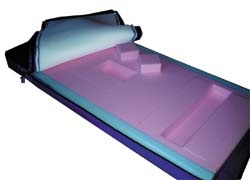Product effectively relieves pressure
During five years of practical experience, Johanna Meyer, Assistant Director of the Nursing Directorate at Gütersloh Municipal Hospital, Germany, has found that a pressure-relieving system made by MTS proved convenient for patients and nurses.

The internationally agreed definition of decubitus is damage to the skin and/or underlying tissue due to pressure or pressure combined with shear force and/or friction, and it predominantly occurs over protuberances. However, successful prevention depends not only on professional care but also on high-quality positioning materials, as experiences have shown in Gütersloh Municipal Hospital, Germany.
Professional standards and guidelines contribute to the high quality of nursing services. Our standards are revised regularly and are based on national expert standards of the German Network for Quality Development in Nursing (DNQP).
Problem case decubitus
One type of therapy for decubitus ulcers is the positioning of patients on pressure-relieving systems, such as DeCube by MTS. This system was first used at our hospital in April 2003; it has since proved very successful. We use 30 products of this type in our hospital; not least due to their simple handling and high patient comfort, which patients substantiate, in that no other technical devices are needed that cause additional heat or noise. DeCube has been used for several hundred patients all over our hospital as an alternative to a previously favoured alternating pressure system. The length of use – depending on the clinical picture of the patient – ranges from a few days to several months.
The material
The DeCube-System consists of cube-shaped, patented pieces of polymer-foam. Removable units are embedded in a base made from particularly wear-resistant material, guaranteeing a firm hold. The foam ensures extremely low pressure levels in areas that are particularly at risk, whilst maintaining microcirculation. This in turn leads to pain reduction and promotes wound healing.
The individual layers of this high-quality foam (patented Engineered Polymer-procedure) guarantee efficient pressure reduction for many years. The additional, inbuilt fringe reinforcement facilitates safe and simple repositioning and mobilisation of a patient. Removable elements allow for a specific additional pressure reduction, particularly for high-risk and un-cooperative patients.
The integrated positioning option is a relief for patients and nurses. Appropriate positioning of the elements facilitates positioning of the heel without pressure, or a seating position with almost vertical back part, without the need for additional aids, e.g. cushions, for all positioning techniques, including decubitus position and inclined plane. In addition to changes of position and mobilisation, the product has proved of value both for prophylaxis and therapy of decubitus ulcers, up to and including stage IV according to Seiler.
Consequential costs, such as maintenance or repair, can be subtracted. Hygienic preparation is not complicated. Only disinfection through wiping is necessary.
28.10.2008









